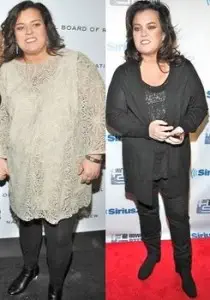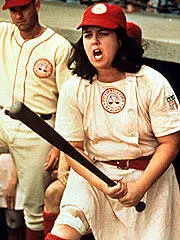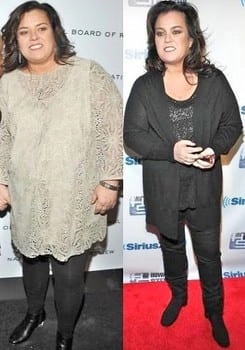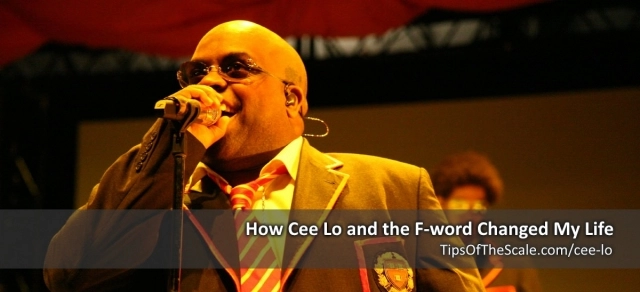In case you missed this week’s hot weight loss news, Rosie O’Donnell has returned to The View 55 pounds lighter than when we last saw her. As a non-regular viewer of The View (and by non-regular I mean that I’ve never watched it), I was not watching live but had the opportunity to read a lot about the subject. Now I’ve never been what you would call a “Rosie O’Donnell Fan”. In fact, I can honestly say I don’t know that I’ve ever heard a person say:
“You know who should do more movies? That Rosie O’Donnell lady!”

Rosie has been pretty candid about some of the challenges that have come with her weight loss. What is really awesome is that in true Tips of the Scale fashion, Rosie is talking a heck of lot more about the mental aspects of her post weight loss world than she is about the physical ones. And you know what? I’ve learned a lot from her this week. I wanted to share some of the lessons that I’ve learned from some of her subsequent interviews.
So pull up a chair, class is in session. Professor O’Donnell, the floor is yours.
Emotional Turbulence does not end with obesity.
“The fact that I look so different has been difficult and unexpected. Everyone assumes that obese people would just be jumping for joy that they were healthier and thinner and able to fit into store-bought sizes, we don’t have to go to the plus store. But it’s also filled with a lot of emotional turbulence you wouldn’t expect.”

There could be books on this subject. She actually mentions in the other video linked below that she can’t go clothes shopping without picking up her old, larger clothes size. She just can’t see herself as a Medium. And when she puts a Medium Shirt on, it fits but she still can’t believe it fits. Rosie says she went to a psychiatrist before losing the weight and a support group after to try and wrap her head around all the changes. And with good reason as Rosie mentions, many marriages end after a dramatic weight loss when one partner is unsupportive or the priorities and dynamics shift significantly.
We often times think that losing weight will solve all our problems but a study released last month in the UK showed that obese individuals who lost weight were 52% more likely to remain depressed than those who stay at their existing weight. Now obviously, they aren’t suggesting that weight loss makes us depressed. Maybe it’s the fact that we expect everything to be ok when in reality, losing weight does not take away from our need to face the demons that haunt the obese versions of ourselves. Perhaps it’s because of unreal expectations set by miracle weight loss products.
The things that got us here need to be acknowledged.
“There are reasons people become big. It’s protection. It’s layers of protection.”
I’m not about to pretend that we all have the same road that led us to obesity, but Rosie initially gained a significant amount of weight after her first talk show started. The weight was a protection from judgment. The weight is something she could blame all failures or mistakes on.
- “Because I’m fat, they didn’t like my show.”
- “Because I’m fat, The relationship didn’t work.”
- “Because I’m fat, I didn’t get the job.”
Knowing how we got here is exactly what we need to discover before we can figure out how to get away from it. Some of us faced critical parents and found safety and comfort in overeating. Some of us used food as a security blanket. Some of us eat when we’re emotional: sad, tired, angry, emotional, lonely. Some of us have addictive personalities. Whatever it is that led us here, it’s important to acknowledge that something created this desire in us.
For me, I had to admit that I was using food as a method of avoiding my real issues. And the truth is that for a while, I ironically used weight loss as another way of avoiding my real issues. I was running from my problems, first with doritos and later with actual running. If I hadn’t stopped running and turned to face them, I would only have ballooned again.
Some people can’t lose weight the “normal” way.
“People who have obesity, metabolic [syndrome], they can’t lose it. If they could, they would. I know some people would argue with that.”
This is an interesting premise, and I’m not sure I entirely agree with it. But the truth is that the science is kind of still out on this issue. Metabolic Syndrome is characterized as having at least three of the five following risky conditions: large waistline, blood glucose issues, high bad triglycerides, low good triglycerides or high blood pressure.
What science isn’t sure of is if these are the cause of weight gain or that weight gain brings this on. Experts almost entirely agree that weight loss and/or dietary modifications will help alleviate some of these issues. But are some of us metabolically broken and physically unable to lose weight?
Maybe.
But one thing I’m sure of is that if you believe you are unable to lose weight, you definitely couldn’t. And for people like this, people like Rosie, weight loss surgery is a good option.
Important Sidenote: You aren’t better than people that did it with surgery so STFU.
Sometimes I think that natural weight losers are real jerks about weight loss surgeries. I did it the “old fashioned” way without surgery and that worked for me. But who the heck am I to judge someone else’s path to good health? Let’s cheer each other on no matter how they got here. There’s nothing wrong with surgery. Disagree with that stance? I’d love to hear from you better than other people guy.
You don’t have to keep up with the Jasmins Joneses.
“I have never gained since I started losing. Sometimes I only lose a half a pound in the whole month, but that’s ok, because anything more than this would flip me out emotionally.”
Rosie’s path was a slow one. She lost 55 pounds in one year and is still not where her doctors want to be. But she is completely ok with her journey going the way that it has and I think that is healthy. She even remarks that her doctors wish she’d lost more weight right now, but she has seen her journey go slow but steady in the right direction.
Such a beautiful, healthy place to be mentally and I have to admit, I have struggled to get and stay at this place. It’s so tempting to compare our ability to lose weight or even the speed by which we do to others. We see those huge weight loss numbers put up by the people at the biggest loser camp and think that we should be able to do the same. When we can’t, we beat ourselves up and think we’re worthless.
Not Rosie. She committed to a journey and not a tempo and she has been a success by all accounts and this is coming from someone who lost 4 times that amount in one year. The speed is irrelevant, it’s the direction that matters.

—–
And that’s what I learned from Rosie O’Donnell. What about you? What can you learn from Rosie?


 “TinierTim” Bauer works in marketing as a professional storyteller who also teaches others to tell their stories. He is a father of two beautiful girls, aged 8 and 5. He lost his first 200 pounds in just 374 days and his greatest accomplishments include running his first triathlon 18 months to the day from starting his journey, having his weight loss described by his then 6 year old daughter as a “metamorphosis” (he’s a butterfly now) and the fact that his daughters are now able to sit in his lap without his belly getting in the way and wrap their arms completely around him. He blogs at TinierTim.com and can be found anywhere people are being Social @TinierTim including
“TinierTim” Bauer works in marketing as a professional storyteller who also teaches others to tell their stories. He is a father of two beautiful girls, aged 8 and 5. He lost his first 200 pounds in just 374 days and his greatest accomplishments include running his first triathlon 18 months to the day from starting his journey, having his weight loss described by his then 6 year old daughter as a “metamorphosis” (he’s a butterfly now) and the fact that his daughters are now able to sit in his lap without his belly getting in the way and wrap their arms completely around him. He blogs at TinierTim.com and can be found anywhere people are being Social @TinierTim including 

You must be logged in to view comments.